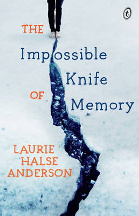The Impossible Knife of Memory by Laurie Halse Anderson

Text, 2014. ISBN 9781922182227.
(Age: 14+) War is something which many teenagers have little
experience of. High school students in Australia are required to
study historical events relating to that violent three-letter word.
It is a distant concept for many young people in this society, but
even more foreign to young people is the lasting impact of war on
returned soldiers. The Impossible Knife of Memory is
concerned with the after-effects, providing insight into the
psychological battles returned soldiers and their families face.
Our narrator, Hayley, is familiar - a sarcastic, defensive outsider.
For eight years she has been 'un-schooled' by her single father, an
Iraq war veteran. The book maps her re-adjustment to conventional
school after this period of nomadic travel, and her struggle to
reconcile her difficult, turbulent past.
This is a strong, hard-hitting novel in many ways. The characters
are human, dynamic and relatable, the prose itself at times poetic
but always with a realistic edge. The extensive dialogue is one of
the highlights, as I find much writing fails to effectively
incorporate conversation into the narrative. The tension builds
gradually and relationships develop in a highly entertaining way
throughout the book. Of course, as hinted earlier, the psychological
impact of war lingers as an obstacle for Hayley, with her own
adolescent issues mirroring her father's post-service trauma. The
only obvious let-down is the unnecessary use of 'text-talk' early in
the story as Hayley establishes relationships with peers at her new
school - this style is inconsistent with the overall serious tone.
The Impossible Knife of Memory works as both a solid piece of
writing for young adults and a meditation on the emotional side of
war not often exposed to young people in study of the topic.
Henry Vaughan (Student)